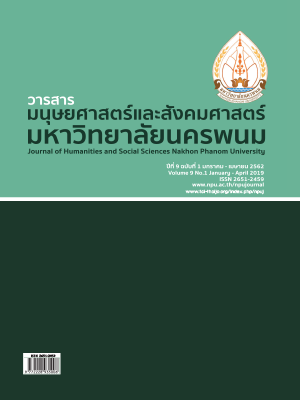Model Development for Enhancing Competency in Measurement and Evaluation of Learning for Teachers in Schools under the Municipality of Sakon Nakhon City
Main Article Content
Abstract
The objectives of this study were to 1) develop examine a learning outcomes of measurement and evaluation capacity building model for teachers in schools under Sakon Nakhon City Municipality. 2) examine a learning outcomes of measurement and evaluation capacity building model for teachers in schools under Sakon Nakhon City Municipality. The study was conducted in 2 phases. The first phase was the development of a learning outcomes of measurement and evaluation capacity building model for teachers in schools under Sakon Nakhon City Municipality, which comprised the following process: (1) the study of relevant concepts, theories, documents and researches and (2) the deliberation on the draft model by 5 experts. The second phase was the appropriateness examination of the developed model. The sample group consisted of 108 school directors and teachers in schools under Sakon Nakhon City Municipality in the academic year B.E. 2560, selected through disproportionate stratified random sampling. The tool of choice in data collection was a 5-level rating scale questionnaire with IOC between 0.80 - 1.00, discrimination value between 0.23 - 0.85 and overall reliability value at 0.97. Statistics implemented in data analysis were mean and standard deviation.
The findings were as follows: 1) The developed learning outcomes of measurement and evaluation capacity building model for teachers in schools under Sakon Nakhon City Municipality comprises 4 factors, which are (1) factors contributing to the success of capacity building (1.1) such as support from original affiliation (1.2) school director leadership (1.3) readiness and determination in self-development of teachers (1.4) school director supervision and (1.5)lecturer expertise. (2) scope of learning outcomes of measurement and evaluation capacity, which consists of 3 aspects namely (2.1) authentic measurement and evaluation (2.2) the implementation of measurement and evaluation results for learning management and curriculum improvement and (2.3) the building and quality defining of learning outcomes measurement tools; 3) capacity building process on measurement and evaluation, comprises 4 steps namely (3.1) need assessment (3.2) planning and goal setting (3.3) capacity building operation, which could be further classified into capacity building by organization and self-capacity building and (3.4) evaluation; (4) the result of learning outcomes of measurement and evaluation capacity building, which consists of (4.1) teachers' understanding in learning outcomes of measurement and evaluation (4.2) teachers' skills in learning outcomes of measurement and evaluation capacity building and (4.3) teachers' positive attitude towards learning outcomes of measurement and evaluation capacity building. 2) The developed learning outcomes of measurement and evaluation capacity building model for teachers in schools under Sakon Nakhon City Municipality has an overall appropriateness at a high level ( = 4.28, S.D. = 0.45).
Article Details
References
สหกรณ์การเกษตรแห่งประเทศไทย.
ทิวัตถ์ มณีโชติ. (2554). การพัฒนาสมรรถนะ ตัวชี้วัด และเครื่องมือวัดด้านการวัดและประเมินผลการศึกษาของครูระดับ
การศึกษาขั้นพื้นฐาน. กรุงเทพฯ : มหาวิทยาลัยราชภัฏพระนคร.
ชูชัย สมิทธิไกร. (2554). การฝึกอบรมบุคลากรในองค์การ. (พิมพ์ครั้งที่ 7). กรุงเทพมหานคร: จุฬาลงกรณ์มหาวิทยาลัย.
บุญชม ศรีสะอาด. (2545). การวิจัยเบื้องต้น. (พิมพ์ครั้งที่ 7). กรุงเทพฯ: สุวีริยาสาส์น.
พรชัย เจดามาน.(2556). การพัฒนาทรัพยากรมนุษย์. [ออนไลน์]. เข้าถึงได้จาก http//www.oknation.net/blog/jedaman
[2 สิงหาคม 2559].
เพิ่มสกุล เล็กสรรเสริญ. (2558). 7 ปัจจัยสู่ความสำเร็จในการจัดอบรม/สัมมนา. [ออนไลน์]. เข้าถึงได้จาก
https://www.trainingdesign.net/ [3 สิงหาคม 2559].
ลัดดา ศิลาน้อย และคณะ. (2554). รูปแบบการบริหารจัดการเพื่อพัฒนาวิชาชีพครูในภูมิภาคตะวันออกเฉียงเหนือตอนบน.
วารสารวิจัย มข. 16(3) : 287.
ศิริชัย กาญจนวาสี. (2552). ทฤษฎีการประเมิน. กรุงเทพฯ : จุฬาลงกรณมหาวิทยาลัย.
ศรีประไพร พลเยี่ยม และ สมใจ ภูมิพันธ์. (2558). ความสัมพันธ์ระหว่างภาวะผู้นำทางวิชาการของผู้บริหารสถานศึกษากับ
ประสิทธิภาพการสอนของครูสังกัดสำนักงานเขตพื้นที่การศึกษาประถมศึกษาบึงกาฬ.วารสารมหาวิทยาลัย
นครพนม. 5(3) : 53.
สมัย วงศ์ษาพาน, อัครพงศ์ ภูติยา, สุวพัชร อุปพงศ์ และวารุณี บุรีมาต.(2559, 30 กันยายน). ศึกษานิเทศก์, ผู้บริหาร
สถานศึกษา, หัวหน้างานวิชาการ และหัวหน้างานวัดผล. สัมภาษณ์.
สุวิมล ว่องวานิช. (2550). วิจัยในชั้นเรียน. กรุงเทพฯ: โรงพิมพ์อักษรไทย.
สำนักการศึกษาเทศบาลนครสกลนคร.(2560). โรงเรียนในสังกัดเทศบาลนครสกลนคร . [ออนไลน์]. เข้าถึงได้จาก
https://www.sakoncity.go.th/ [3 มีนาคม 2560].
สำนักงานเลขาธิการสภาการศึกษา. (2553). ข้อเสนอการปฏิรูปการศึกษาในทศวรรษที่สอง (พ.ศ. 2552-2561).
กรุงเทพฯ: พริกหวานกราฟฟิค.
อพันตรี พูลพุทธา. (2560). การพัฒนาสมรรถนะการวัดและประเมินผลการเรียนรู้ของนักศึกษาฝึกประสบการณ์วิชาชีพครู
กรณีมหาวิทยาลัยราชภัฏมหาสารคาม. วิทยานิพนธ์ ปร.ด. มหาสารคาม: มหาวิทยาลัยมหาสารคาม.
Heneman, H. G., Schwab, D. P., Fossum, J. A., & Dyer, L. D. (1983). Personnel/Human Resource
Management. Illinois: Irwin.
Nicole Strangman, Tracey Hall & Anne Meyer. (2014). Differentiated Instruction and Implications for UDL
Implementation. Wakefield, MA: National Center on Accessing the General Curriculum.
Werner, J. M., & Desimone, R. L. (2006). Human Resource Development. (4th ed.) Mason, Ohio : Thomson
South-Western.


